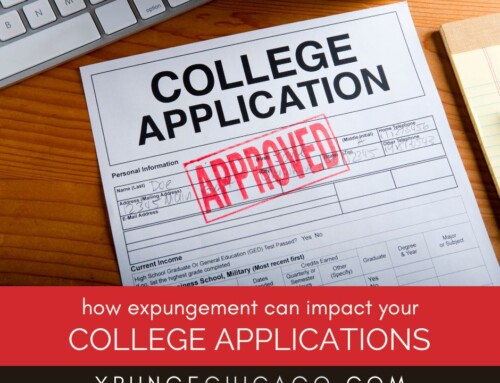If you’re like many people, you’ve heard the popular myth that your criminal record clears after seven years.
But it’s just that: A myth.
Does Your Criminal Record Clear After 7 Years?
When you have a criminal record, it lasts forever unless you take action and work through official channels to clear it. There’s no seven-year “dropoff” period in which a criminal record is erased.
So how can you clear your criminal record yourself?
Here’s what you need to know.

There’s No 7-Year Criminal Record “Dropoff” – So Here’s How to Clear Your Record
There are two ways to clean up a criminal record in the state of Illinois: Expungement and sealing. Both are similar processes with different end results.
Expungement is the process of having your record erased permanently. It’s like your record never existed in the first place.
Sealing prevents most people from accessing your record. Your criminal history won’t come up in a standard background check (although it will come up in a fingerprint-based background check, so government agencies, the police and some employers – such as those in the healthcare field – will still see it).

How Do You Know Whether to Expunge or Seal?
Only some criminal histories are eligible for expungement. Those that aren’t may be eligible for sealing.
For the most part, you cannot expunge convictions. That means if you were found guilty of a crime, you can’t expunge it from your record. You can expunge:
- Arrests that didn’t result in charges
- Offenses that you were found not guilty for in court
- Some eligible misdemeanors or Class 4 cannabis convictions under the Illinois Cannabis Regulation and Tax Act
- Offenses you have had pardoned by the governor
- Convictions that were reversed or vacated
- Sentences for court supervision, but only in some cases (you should talk to a Chicago expungement lawyer to find out whether your case qualifies)
- Some sentences of qualified probation (but again, you should talk to a lawyer about your case)
Related: What crimes can be expunged in Illinois?
If your record doesn’t qualify for expungement, you may still qualify for criminal record sealing. Remember, your criminal record doesn’t automatically clear itself after seven years – so you will need to take action through expungement or sealing if you don’t want your past hanging over your head any longer.
You can seal arrests and charges for misdemeanors and felonies that never led to a conviction, except minor traffic offenses for which you were released without being charged. You can also seal most misdemeanors and felonies that you were convicted of – but these are the exceptions:
- Driving offenses, such as driving under the influence or reckless driving (unless you were under 25 at the time of the offense and you have no other convictions for DUI or reckless driving)
- Domestic battery
- Violation of an order of protection
- Sexual offenses, including soliciting or patronizing a prostitute, public indecency, any offense that requires you to register as a sex offender, or any other misdemeanor listed under Article 11 of the Criminal Code (except prostitution)
- Animal offenses, such as dog fighting and Class A misdemeanors under the Humane Care for Animals Act
- New felony convictions if you have already had felony convictions sealed
Your Criminal Record Doesn’t Disappear After 7 Years – So Do You Need to Talk to an Expungement Attorney?
Because your criminal record is permanent – it doesn’t disappear after seven years – you may want to talk to an attorney about clearing it yourself.
Call our office at 847-920-4540 for a free case review now. We can let you know whether you qualify for expungement or sealing, and then we can help you make it happen.
Oops! We could not locate your form.














